Related Research Articles

Giovanni Falcone was an Italian judge and prosecuting magistrate. From his office in the Palace of Justice in Palermo, Sicily, he spent most of his professional life trying to overthrow the power of the Sicilian Mafia. After a long and distinguished career, culminating in the Maxi Trial in 1986–1987, on 23 May 1992, Falcone was assassinated by the Corleonesi Mafia in the Capaci bombing, on the A29 motorway near the town of Capaci.

Paolo Emanuele Borsellino was an Italian judge and prosecuting magistrate. From his office in the Palace of Justice in Palermo, Sicily, he spent most of his professional life trying to overthrow the power of the Sicilian Mafia. After a long and distinguished career, culminating in the Maxi Trial in 1986–1987, on 19 July 1992, Borsellino was killed by a car bomb in Via D'Amelio, near his mother's house in Palermo.

Salvatore Achille Ettore Lima, often referred to as Salvo Lima, was an Italian politician from Sicily who was associated with, and murdered by, the Sicilian Mafia. According to the pentito Tommaso Buscetta, Lima's father, Vincenzo Lima, was a member of the Mafia but is not known whether Lima himself was a made member of Cosa Nostra. In the final report of the first Antimafia Commission (1963–1976), Lima was described as one of the pillars of Mafia power in Palermo.
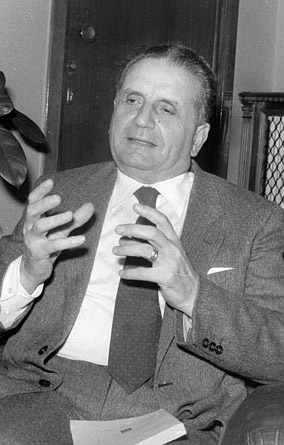
Rocco Chinnici was an Italian anti-Mafia magistrate killed by the Sicilian Mafia.

The Maxi Trial was a criminal trial against the Sicilian Mafia that took place in Palermo, Sicily. The trial lasted from 10 February 1986 to 30 January 1992, and was held in a bunker-style courthouse specially constructed for this purpose inside the walls of the Ucciardone prison.

Michele Greco was a member of the Sicilian Mafia and a convicted murderer. Greco died in prison while serving multiple life sentences. His nickname was Il Papa due to his ability to mediate between different Mafia families. Greco was the head of the Sicilian Mafia Commission.

Piersanti Mattarella was an Italian politician who was assassinated by the Mafia while he held the position of President of the Regional Government of Sicily. A member of Christian Democracy, he was the older brother of Sergio Mattarella, who has been President of Italy since 2015.
The Sicilian Mafia Commission, known as Commissione or Cupola, is a body of leading Sicilian Mafia members who decide on important questions concerning the actions of, and settling disputes within the Sicilian Mafia or Cosa Nostra. It is composed of representatives of a mandamento who are called capo mandamento or rappresentante. The Commission is not a central government of the Mafia, but a representative mechanism for consultation of independent Mafia families who decide by consensus. Its primary role is to keep the use of violence among families within limits tolerable to the public and political authorities.
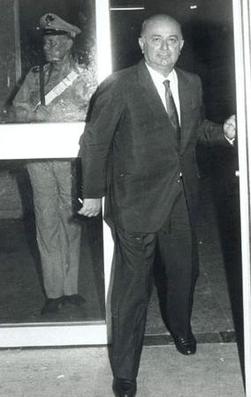
Ignazio Salvo and his cousin Nino Salvo were two wealthy businessmen from the town of Salemi in the province of Trapani. They had strong political connections with the Christian Democracy party, in particular with the former mayor of Palermo, Salvo Lima, and Giulio Andreotti. At the Maxi Trial against the Sicilian Mafia in the mid-1980s, they were convicted of association with Mafia members.
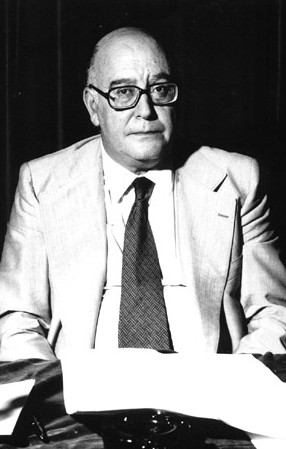
Cesare Terranova was an Italian judge and politician from Sicily, notable for his anti-Mafia stance. From 1958 until 1971 Terranova was an examining magistrate at the Palermo prosecuting office. He was one of the first to seriously investigate the Mafia and the financial operations of Cosa Nostra. He was killed by the Mafia in 1979.

Salvatore Cancemi was an Italian mobster and member of the Sicilian Mafia from Palermo. He is the first member of the Sicilian Mafia Commission that turned himself in voluntarily to become a pentito, a collaborator with the Italian judicial authorities. Cancemi made controversial allegations about the collusion of Prime Minister Silvio Berlusconi and his right-hand man Marcello Dell'Utri with the Mafia.
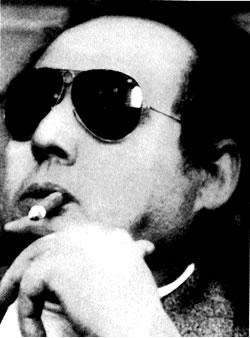
The Corleonesi Mafia clan was a faction within the Corleone family of the Sicilian Mafia, formed in the 1970s. Notable leaders included Luciano Leggio, Salvatore Riina, Bernardo Provenzano, and Leoluca Bagarella.
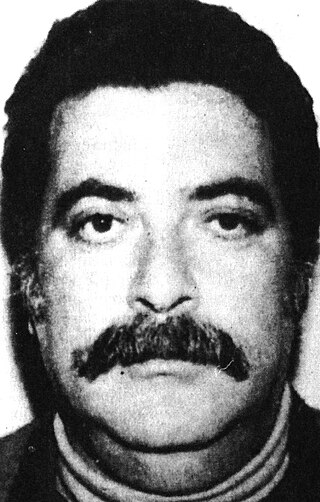
Antonino Calderone was a Sicilian Mafioso who turned state witness (pentito) in 1987 after his arrest in 1986.
Gaspare Mutolo is a Sicilian mafioso, also known as "Asparino". In 1992 he became a pentito. He was the first mafioso who spoke about the connections between Cosa Nostra and Italian politicians. Mutolo's declarations contributed to the indictment of Italy's former Prime Minister Giulio Andreotti and to an understanding of the context of the 1992 Mafia murders of the politician Salvo Lima and the magistrates Giovanni Falcone and Paolo Borsellino.
The Second Mafia War was a period of conflict involving the Sicilian Mafia, mostly taking place from 1981 to 1984 and involved thousands of homicides. Sometimes referred to as The Great Mafia War or the Mattanza, it involved the entire Mafia and radically altered the power balance within the organization. In addition to the violence within the Mafia itself, there was violence against the state, including a campaign of deliberate assassinations of judges, prosecutors, detectives, politicians, activists and other ideological enemies. In turn, the war resulted in a major crackdown against the Mafia, helped by the pentiti, Mafiosi who collaborated with the authorities after losing so many friends and relatives to the fighting. In effect, the conflict helped end the secrecy of the Mafia.
Salvatore Greco, also known as "l'ingegnere" or "Totò il lungo", was an Italian criminal and member of the Sicilian Mafia. He was born in Ciaculli, as the son of Pietro Greco, who was killed during a bloody internal feud between the factions of the Greco Mafia clan in Ciaculli and Croceverde Giardini in 1946. His cousin Salvatore Greco "Ciaschiteddu" was the first ‘secretary’ of the Sicilian Mafia Commission.

Francesco "Ciccio" Madonia was the Mafia boss of the San Lorenzo-Pallavicino area in Palermo. In 1978 he became a member of the Sicilian Mafia Commission.
Baldassare Di Maggio, also known as Balduccio, was a member of the Mafia, who became a government witness. He helped the police to capture the head of Cosa Nostra, Totò Riina, and claimed that Riina respectfully kissed three-time prime minister Giulio Andreotti when they met in 1987.
Raffaele Ganci was a member of the Mafia in Sicily from the Noce neighbourhood in Palermo. He was considered to be the right-hand man of Cosa Nostra boss Totò Riina and sat on the Sicilian Mafia Commission.

Salvatore Riina, called Totò, was an Italian mobster and chief of the Sicilian Mafia, known for a ruthless murder campaign that reached a peak in the early 1990s with the assassinations of Antimafia Commission prosecutors Giovanni Falcone and Paolo Borsellino, resulting in widespread public outcry and a major crackdown by the authorities. He was also known by the nicknames la belva and il capo dei capi.
References
- ↑ Jamieson, The Antimafia, p. 29
- 1 2 3 Giovanni Falcone, Paolo Borsellino and the Procura of Palermo Archived 2012-10-21 at the Wayback Machine , Peter Schneider & Jane Schneider, May 2002, essay is based on excerpts from Chapter Six of Jane Schneider and Peter Schneider, Reversible Destiny: Mafia, Antimafia, and the Struggle for Palermo , Berkeley: University of California Press
- ↑ Stille, Excellent Cadavers, pp. 85-90